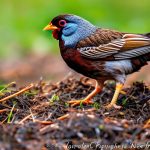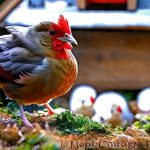Mosquitoes pose significant threats to chickens, affecting both their health and well-being. These insects can transmit various diseases to chickens, including West Nile virus, avian malaria, and fowlpox. Beyond disease transmission, mosquitoes cause discomfort and stress, potentially leading to reduced egg production and overall diminished flock health.
The presence of mosquitoes can disrupt the peaceful environment of the chicken coop, further impacting the birds’ quality of life. Chickens play a dual role in farm ecosystems. They are valued for their eggs and meat, but also serve as natural pest controllers by consuming insects, including mosquitoes.
When mosquitoes become a threat to chickens, this ecological balance can be disrupted, potentially leading to broader consequences for farm pest management. Given these risks, it is crucial for chicken owners to recognize the dangers mosquitoes present to their flocks. Implementing effective mosquito control strategies is essential to maintain the health, productivity, and comfort of chickens.
By taking proactive measures, chicken owners can protect their birds from mosquito-related health issues and ensure the continued benefits of having chickens as part of their farm ecosystem.
Table of Contents
- 1 The Dangers of Mosquitoes for Chickens
- 2 Natural Methods to Keep Mosquitoes Away from Chickens
- 3 Using Repellents to Protect Chickens from Mosquitoes
- 4 Environmental Modifications to Reduce Mosquito Populations
- 5 Monitoring and Managing Mosquito Infestations
- 6 Conclusion and Summary of Key Strategies for Keeping Chickens Safe from Mosquitoes
- 7 FAQs
- 7.1 What are the best ways to keep mosquitoes away from chickens?
- 7.2 What are some mosquito-repelling plants that can be used around the chicken coop?
- 7.3 How can mosquito netting or screens be used to protect chickens from mosquitoes?
- 7.4 Why is it important to eliminate standing water around the chicken coop?
- 7.5 Are there any natural mosquito repellents that can be used around the chicken coop?
Key Takeaways
- Mosquitoes can pose a significant threat to chickens, as they can transmit diseases such as West Nile virus and avian malaria.
- Natural methods to keep mosquitoes away from chickens include using plants like citronella and lavender, as well as introducing mosquito-eating fish to water sources.
- Repellents such as DEET and permethrin can be used to protect chickens from mosquitoes, but care must be taken to avoid harming the chickens.
- Environmental modifications such as removing standing water and using mosquito traps can help reduce mosquito populations around chicken coops.
- Regular monitoring of mosquito populations and implementing management strategies, such as biological control and habitat modification, can help keep chickens safe from mosquitoes.
The Dangers of Mosquitoes for Chickens
Discomfort and Stress
Mosquito bites can cause itching, irritation, and stress for chickens, leading to decreased egg production and overall well-being. The constant biting and buzzing can disrupt the peace and comfort of the flock, leading to agitated and restless behavior.
Disease Transmission
Mosquitoes can transmit a range of diseases to chickens, including West Nile virus, avian malaria, and fowlpox. These diseases can cause symptoms such as weakness, paralysis, anemia, and even death in severe cases. The presence of mosquitoes in the chicken coop can lead to a higher risk of disease transmission, putting the entire flock at risk.
Impact on Behavior and Productivity
The presence of mosquitoes can disrupt the natural behavior and sleep patterns of chickens, leading to decreased egg production and overall productivity. The stress and discomfort caused by mosquito bites can also lead to behavioral issues, such as aggression and feather pecking. Overall, the dangers of mosquitoes for chickens are multifaceted, ranging from physical discomfort and stress to serious health risks and decreased productivity.
Natural Methods to Keep Mosquitoes Away from Chickens

There are several natural methods that chicken owners can use to keep mosquitoes away from their flock. One effective strategy is to introduce mosquito-repelling plants in and around the chicken coop. Plants such as citronella, lavender, marigold, and basil are known for their mosquito-repelling properties and can help create a natural barrier against these pesky insects.
Additionally, maintaining a clean and well-ventilated coop can help reduce mosquito populations, as stagnant water and damp areas provide ideal breeding grounds for mosquitoes. Regularly cleaning water containers, removing standing water, and ensuring proper drainage can help minimize mosquito breeding sites in the vicinity of the coop. Another natural method to keep mosquitoes away from chickens is to introduce natural predators of mosquitoes in the area.
For example, introducing fish such as gambusia or goldfish in ponds or water sources near the coop can help control mosquito larvae populations. Additionally, encouraging natural predators such as dragonflies, bats, and birds in the area can help keep mosquito populations in check. Providing suitable habitats for these natural predators, such as water sources for dragonflies and bat houses for bats, can help create a balanced ecosystem that naturally controls mosquito populations.
Using Repellents to Protect Chickens from Mosquitoes
In addition to natural methods, there are also several repellents that can be used to protect chickens from mosquitoes. One effective option is to use essential oils with mosquito-repelling properties, such as citronella, eucalyptus, peppermint, or lemongrass. These essential oils can be diluted with water and sprayed in and around the chicken coop to create a natural barrier against mosquitoes.
Additionally, hanging mosquito-repelling herbs such as lavender or basil in the coop can help keep mosquitoes at bay. Another option is to use commercial mosquito repellents that are safe for use around chickens. There are several mosquito repellent products specifically designed for use in animal housing areas that are safe for chickens and other livestock.
These products typically contain natural ingredients such as citronella or geraniol and can be applied to surfaces or sprayed in the air to repel mosquitoes. It is important to carefully follow the instructions provided by the manufacturer when using commercial repellents around chickens to ensure their safety and effectiveness.
Environmental Modifications to Reduce Mosquito Populations
Environmental modifications can also be made to reduce mosquito populations in the vicinity of the chicken coop. One effective strategy is to implement proper water management practices to eliminate potential breeding sites for mosquitoes. This includes regularly cleaning water containers, ensuring proper drainage, and removing any standing water in the area.
Additionally, using biological control methods such as introducing mosquito-eating fish or using bacterial larvicides can help reduce mosquito populations in ponds or water sources near the coop. Another environmental modification that can help reduce mosquito populations is to implement landscaping techniques that discourage mosquito breeding. This includes planting mosquito-repelling plants such as citronella or marigold around the coop and creating barriers such as hedges or shrubs to prevent mosquitoes from entering the area.
Additionally, using outdoor lighting that does not attract mosquitoes can help minimize their presence around the coop. Making these environmental modifications can help create an inhospitable environment for mosquitoes and reduce their populations in the vicinity of the chicken coop.
Monitoring and Managing Mosquito Infestations

Monitoring Mosquito Populations
Regular monitoring of mosquito populations in and around the chicken coop is essential for effective management of infestations. This can be done by conducting regular inspections of the coop and surrounding areas for signs of mosquito activity, such as larvae in water sources or adult mosquitoes resting on surfaces. Keeping track of mosquito populations over time can help identify trends and determine the effectiveness of control measures implemented.
Proactive Management Strategies
In addition to monitoring, proactive management strategies should be implemented to control mosquito infestations around the chicken coop. This may include using larvicides or biological control methods to target mosquito larvae in water sources near the coop. Additionally, implementing physical barriers such as screens or nets on windows and doors can help prevent adult mosquitoes from entering the coop.
Maintenance of Barriers
Regular maintenance of these barriers is essential to ensure their effectiveness in keeping mosquitoes out.
Conclusion and Summary of Key Strategies for Keeping Chickens Safe from Mosquitoes
In conclusion, mosquitoes pose several dangers to chickens, ranging from physical discomfort and stress to serious health risks and decreased productivity. It is crucial for chicken owners to be aware of these dangers and implement effective strategies to keep their flock safe from mosquitoes. Natural methods such as introducing mosquito-repelling plants, encouraging natural predators, and maintaining a clean coop can help keep mosquitoes away from chickens.
Additionally, using repellents and making environmental modifications can further reduce mosquito populations in the vicinity of the coop. Regular monitoring and proactive management of mosquito infestations are essential for long-term control of these pesky insects. Overall, by implementing a combination of these strategies, chicken owners can create a safe and comfortable environment for their flock while minimizing the risks posed by mosquitoes.
It is important to prioritize the well-being of chickens and take proactive measures to protect them from the dangers of mosquitoes. By doing so, chicken owners can ensure a healthy and productive flock while maintaining a balanced ecosystem on the farm.
If you’re looking for ways to keep mosquitoes away from your chickens, you may also be interested in learning about the benefits of keeping guinea fowl on your property. According to Poultry Wizard, guinea fowl are natural insect control experts and can help reduce the mosquito population around your coop.
FAQs
What are the best ways to keep mosquitoes away from chickens?
Some effective methods to keep mosquitoes away from chickens include using mosquito-repelling plants, installing mosquito netting or screens around the coop, and eliminating standing water where mosquitoes breed.
What are some mosquito-repelling plants that can be used around the chicken coop?
Plants such as citronella, lavender, marigold, and basil are known to repel mosquitoes and can be planted around the chicken coop to help keep mosquitoes away.
How can mosquito netting or screens be used to protect chickens from mosquitoes?
Mosquito netting or screens can be installed around the chicken coop to create a barrier that prevents mosquitoes from entering and bothering the chickens. This can help reduce the risk of mosquito-borne diseases and discomfort for the chickens.
Why is it important to eliminate standing water around the chicken coop?
Mosquitoes breed in standing water, so eliminating any sources of standing water around the chicken coop can help reduce the mosquito population in the area and minimize the risk of mosquito-borne diseases for the chickens.
Are there any natural mosquito repellents that can be used around the chicken coop?
Natural mosquito repellents such as essential oils (e.g., citronella, lavender, eucalyptus) and garlic can be used around the chicken coop to help repel mosquitoes. These can be applied to the coop or surrounding areas to create a mosquito-repelling barrier.
Meet Walter, the feathered-friend fanatic of Florida! Nestled in the sunshine state, Walter struts through life with his feathered companions, clucking his way to happiness. With a coop that’s fancier than a five-star hotel, he’s the Don Juan of the chicken world. When he’s not teaching his hens to do the cha-cha, you’ll find him in a heated debate with his prized rooster, Sir Clucks-a-Lot. Walter’s poultry passion is no yolk; he’s the sunny-side-up guy you never knew you needed in your flock of friends!







